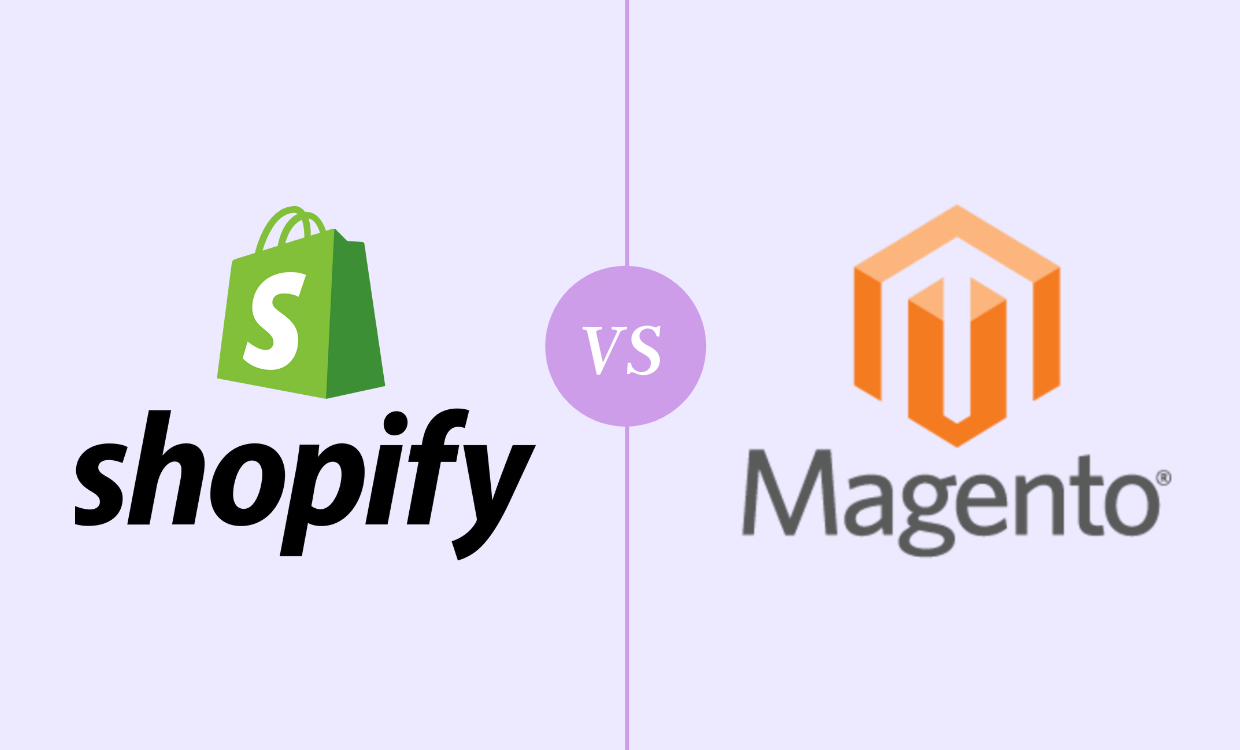Shopify and Magento both are powerful e-commerce websites. Choosing one between them without comparing can be risky for your business. So here is a detailed comparison between both the e-commerce giants.

Shopify is an e-commerce platform that works on a monthly plan basis. While Magento is an open-source platform like WordPress. You only need web hosting to be here. Now let’s evaluate all the points to strike out the difference between the two.
Pros and cons
1. Ease of Use
Ease of use can dramatically impact a business and its resources. Picking an e-commerce software that’s hard to manage won’t benefit you.
Compared to ease of use, Shopify bagged the profit. It is much easier to use. An e-commerce site can be easily created on it by the drag-and-drop method.
Magento e-commerce sites require proper coding. To build an online store you need to hire a freelance web developer. But it is more flexible than its competitor. Using proper codes you can customize your website to match your requirements.
2. Themes and customization
Themes and designs impact the decisions of 48% of customers visiting your website. Selecting the perfect theme can create a positive image of your brand in your customer’s head and boost your sales.
Shopify has around 10 free themes and 64 premium themes ranging from $140 and $180 each. Shopify themes are mobile responsive and offer endless customization. With the help of a freelance Shopify developer, you can create the perfect site for your business.
Magento offers ready-made themes. They don’t need any customization but they are very expensive in comparison to other online service providers. An average ready-made theme on this platform can cost up to $100 while a customized one can range from $600 to $25,000.
3. Sales and Marketing Tools
Sales and marketing tools are the backbones of every e-commerce platform. Both offer equally impressive features in this domain. Some of the best features offered by these e-commerce platforms are:
- Abandoned cart recovery
- Multi-channel selling
- Selling both physical and digital products
- Partnerships with Canada Post, USPS, UPS, and DHL Express.
Magento has exceptional in-built tools to boost sales and marketing. Some of its outstanding features are:
- Multi-channel selling options
- Checkout customization
- Abandoned cart recovery
- Percentage setting
- Fixed price discounts
4. Apps and Add-Ons features
In-built features are not always enough to compete in this e-commerce market. Extra apps and add-ons can exert more push to your growing business.
Shopify has more than 1,200 apps (including premium and free applications). It has more polished apps to offer like Trust Hero, MailChimp, Trackr, and Analytics Buddy. They cover all domains of the e-commerce business.
While Magento has more versatile Add-on features. It offers 5,000 extensions ranging from $30 to $2,000. But out of 5000 extensions,1970 are free.
It also offers some good apps like Amasty Multiple Coupons, Product Pre-Order, Remarkety, Banner Slider, etc.
5. Payment methods and transaction fees
Payment processors are an important part of online transactions. A hassle-free payment method is liked by everyone and thankfully both the e-commerce giant offers this.
Shopify’s own payment processor, Shopify Payments charges zero transaction fee (excluding the regular credit card processing fee). Different monthly plans of this online service provider have different processing fees. For instance:
- Basic- 2.9% + 30¢ per transaction
- Shopify- 2.6% + 30 ¢ per transaction
- Advanced- 2.4% + 30¢ per transaction
It has other payment options also. It includes popular gateway methods like PayPal, Amazon Pay, Stripe, and Apple Pay.
Magneto also has around 150+ gateways but they primarily focus on big businesses.
6. Seo (Search engine optimization)
SEO techniques differ for both of them. Shopify relies more on its apps for SEO. It does not offer much space for SEO on web pages. But you can search its app store for SEO customization techniques.
While its competitor offers plenty of space and customization techniques to increase the ranking of web pages. It often comes with SEO guides to ensure the proper implementation of SEO techniques. URLs, alt tags, and other built-in features can be used in Magneto for increasing the SEO rankings of the web page.
7. Help and Support
The faster you can fix the issue the better you will make sales. It’s a simple unwritten rule of e-commerce business. Having a strong help and support team behind your back is necessary.
Both platforms excel in this field. Magento offers excellent user guides to guide throughout the store building journey. It does not have a dedicated team for help and support but you can take help from SiteGround’s help and support team. They are an amazing team of professional web developers.
Shopify’s help and support team is very supportive and can cover every domain for its users. Some of its facilities are:
- Social media support
- 24/7 phone support
- 24/7 live chat support
- Community forum
- Help center
- Email support
- Video tutorials
- Advanced expert support
8. Pricing and plans
Pricing & plans differs a lot for both platforms. Shopify is a hosted platform. All the expenditures of web hosting, extensions, security, and the domain are already included in its monthly plan.
While Magento eCommerce pricing is different because it is an open-source platform. The total Magento pricing of each month will depend on different factors.
Both have some basic monthly plans
Magento pricing (supported by Github)
- Startup: $9.95/month
- Grow Big: $19.95/month
- GoGeek: $29.95/month
Shopify plans and pricings
- Basic- $29/month
- Shopify- $79/month
- Advance- $299/month
Magento vs Shopify has some startling similarities which make both of them a good choice for an e-commerce business. But the major difference between them is that Magento focuses on big businesses while Shopify can accommodate businesses of any size.
Meta: Magento vs Shopify both are excellent e-commerce website providers. Magento focuses on big businesses. Shopify is good for all-size businesses.